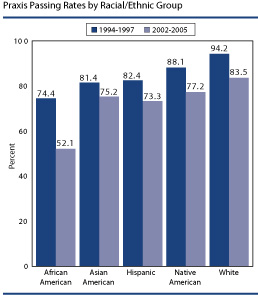Evidence that the nation's teacher pool is attracting greater talent is welcome indeed, but it's hard not to take issue with the spin put on such news by the Educational Testing Service (ETS) in a study it released last week. Updating a singularly useful report (though also cast with a dizzying spin) from a decade ago, ETS gives us the good news that SAT scores and college GPAs of teacher candidates are on the rise.
What led to this increase? ETS credits these improvements to NCLB's teacher quality requirements (yes, the highly qualified teacher provision!), increased accountability under the Higher Education Act, stronger accreditation standards from NCATE, the expansion of alternate route programs, and greater selectivity in admissions to ed schools. Virtually everyone gets a pat on the back. The accompanying press release touts the "unprecedented" "confluence of policy changes at the federal, state and institutional levels."
It would have been easier to share in the rosy glow were ETS not so pandering of its business chums in the states and ed schools. Contrary to the norms of most academic studies, nowhere is there a discussion of any less congratulatory reasons why scores went up. For example, there was a major overhaul of the SAT a few years ago; might its redesign have been a factor? If not, why not?
Ignored is a whole lot of evidence that the federal, state, and local policy arena has responded dismally to the teacher quality challenge. Consider the gaming of the new reporting requirements under HEA, which allow ed schools to effectively hide the high failure rates of teacher candidates on state licensing tests. Or milk toast accreditation standards that portend to tell ed schools what teachers need to know and be able to do, but anything goes. Or the weakness of academic admission standards by both traditional and alternative certification programs--which make it harder to qualify to play college football in some colleges than it is to get into their ed school. Or even licensing tests where the minimum score needed to pass is set so low, it's possible to pass getting only a third of the questions right. (Feel like reading more? See NCTQ's State Teacher Policy Yearbook .)
You'll have to look past the ETS press release if you want to find out that the rise in scores only occurs for secondary teachers, who were doing pretty well anyway, according to the last ETS report on this subject. SAT scores and GPAs of elementary and special education candidates did not improve and remain significantly lower than college students who choose other professions.
The increase in GPA scores too are suspect, as the data are self-reported under a documented period of grade inflation, fueled by new ed school requirements that teacher candidates must retain a certain GPA. That's the fundamental problem with using GPAs as a yardstick of teacher quality. It's a moveable bar. Require a 2.5 GPA and all of a sudden professors find it in their heart to raise a C to a B-.
What's most disturbing in this report is how ETS handled the reporting of its own testing data trends, in particular the staggering decline in pass rates on the Praxis tests among African American teacher candidates. ETS presents a table (shown here as well) to support its happy contention that ed schools have raised their standards. All well and good, but the disproportionate impact of this policy on African Americans gets nary a mention, even though the drop in their pass rates is twice that of any other group--adding up to a startling 22 percent drop in just ten years. This finding calls out for concern, explanation--we'll even take speculation--but, most of all, a renewed commitment to tackling chronic and pernicious minority underachievement. You won't find it in this report.

